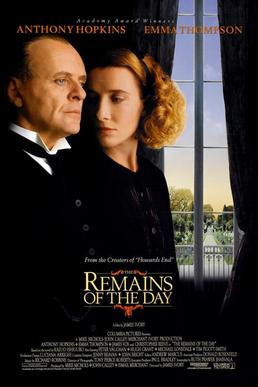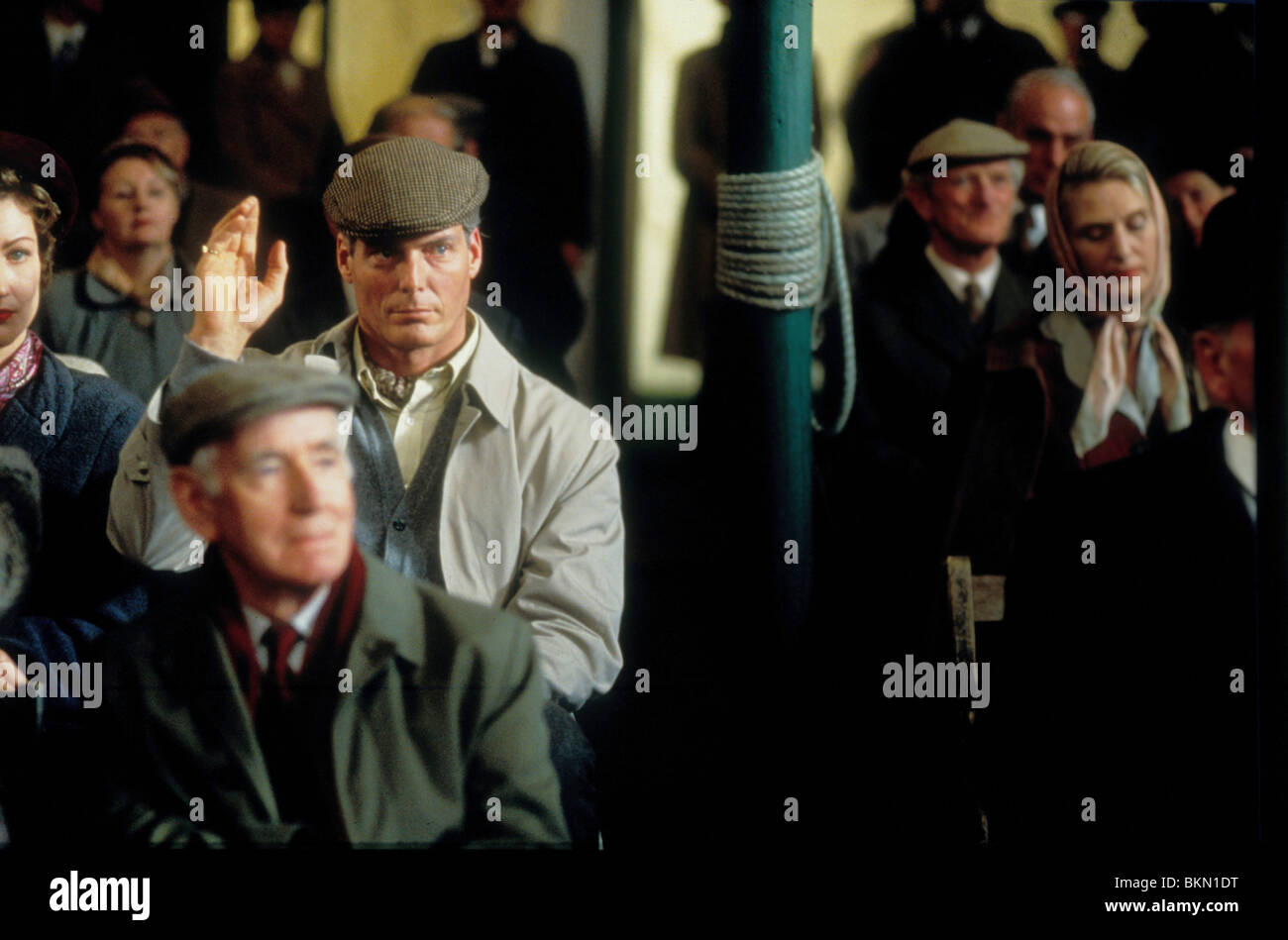← Back to Reviews
in
The Remains of the Day
The 1993 Merchant/Ivory production The Remains of the Day is, on the surface, a sweeping and sumptuous epic of passion, politics, duty, and romance, but is really a beautifully crafted character study of a man who has sacrificed his life, his feelings, his convictions, and opinions behind the glossy veneer of his work. A beautifully crafted story that received eight Oscar nominations, including Best Picture.

James Stevens is a butler at an expansive British estate known as Darlington Manor where he is now employed by a wealthy American diplomat named Lewis. Stevens is anticipating a reunion with Miss Kenton (Emma Thompson), the housekeeper he worked with during his tenure at the manor under the former owner, Lord Darlington, a suspected Nazi sympathizer. The story then flashes back to Britain right before the outbreak of WWII when Stevens hires Miss Kenton to be the head housekeeper, leading to amicable working relationship and an unspoken romance.

Ruth Prawer Jhabvala's Oscar-nominated screenplay is an urbane and sophisticated look at British aristocracy that perfectly conveys the British obsession with appearance and how diplomacy is more important than confrontation. Every word that comes out of the mouth of every character's mouth is carefully chosen and hardly anyone in this story, with the possible exception of Miss Kenton, says exactly what they mean or what they really want to say because it wouldn't be proper. Therefore, feelings and emotions get buried and become the crux of the dual stories at the forefront of this drama.

At the core of this story is this character James Stevens, who has devoted his life to his work and, in order to do so, must bury everything he feels or believes, or at least this is how he feels. More than once, we see Stevens' opinion on certain matters broached and he refuses to offer any opinions. The irony of this is that no matter what Stevens is asked, we can see his feelings and opinion written all over his face, which is to be credited to the Oscar-nominated direction of James Ivory and the richly complex, Oscar-nominated performance from Sir Anthony Hopkins as Stevens. The other story is the non-conventional romance between Stevens and Miss Kenton, that doesn't play as a romance...the word "love" never passes between them and they never share a kiss. There is a beautifully heartbreaking scene where Miss Kenton catches Stevens reading a book and we see all his guards drop as he looks at Miss Kenton for the first time without reservation. We don't even learn Miss Kenton's first name until the final third of the film.

This multi-layered tale is enhanced by incredible production values. Especially impressive were Tony Pierce-Roberts' cinematography, John Ralph's art direction, and Richard Robbins' moody music. Anthony Hopkins' incredible performance in the starring role is easily the finest work of his that I've seen and I'm shocked that he didn't win a second Oscar for this delicately nuanced performance, matched scene for scene by the accustomed crisp and passionate work of Emma Thompson as Miss Kenton. The supporting cast is solid, especially James Fox as Lord Darlington, Christopher Reeve as Lewis (once again proving what an underrated actor he was), Peter Vaughan as Stevens' father, and a young Hugh Grant as Darlington's slightly smarmy grandson. A sad and haunting tale that will stay with you as the credits roll.
The 1993 Merchant/Ivory production The Remains of the Day is, on the surface, a sweeping and sumptuous epic of passion, politics, duty, and romance, but is really a beautifully crafted character study of a man who has sacrificed his life, his feelings, his convictions, and opinions behind the glossy veneer of his work. A beautifully crafted story that received eight Oscar nominations, including Best Picture.

James Stevens is a butler at an expansive British estate known as Darlington Manor where he is now employed by a wealthy American diplomat named Lewis. Stevens is anticipating a reunion with Miss Kenton (Emma Thompson), the housekeeper he worked with during his tenure at the manor under the former owner, Lord Darlington, a suspected Nazi sympathizer. The story then flashes back to Britain right before the outbreak of WWII when Stevens hires Miss Kenton to be the head housekeeper, leading to amicable working relationship and an unspoken romance.

Ruth Prawer Jhabvala's Oscar-nominated screenplay is an urbane and sophisticated look at British aristocracy that perfectly conveys the British obsession with appearance and how diplomacy is more important than confrontation. Every word that comes out of the mouth of every character's mouth is carefully chosen and hardly anyone in this story, with the possible exception of Miss Kenton, says exactly what they mean or what they really want to say because it wouldn't be proper. Therefore, feelings and emotions get buried and become the crux of the dual stories at the forefront of this drama.

At the core of this story is this character James Stevens, who has devoted his life to his work and, in order to do so, must bury everything he feels or believes, or at least this is how he feels. More than once, we see Stevens' opinion on certain matters broached and he refuses to offer any opinions. The irony of this is that no matter what Stevens is asked, we can see his feelings and opinion written all over his face, which is to be credited to the Oscar-nominated direction of James Ivory and the richly complex, Oscar-nominated performance from Sir Anthony Hopkins as Stevens. The other story is the non-conventional romance between Stevens and Miss Kenton, that doesn't play as a romance...the word "love" never passes between them and they never share a kiss. There is a beautifully heartbreaking scene where Miss Kenton catches Stevens reading a book and we see all his guards drop as he looks at Miss Kenton for the first time without reservation. We don't even learn Miss Kenton's first name until the final third of the film.
This multi-layered tale is enhanced by incredible production values. Especially impressive were Tony Pierce-Roberts' cinematography, John Ralph's art direction, and Richard Robbins' moody music. Anthony Hopkins' incredible performance in the starring role is easily the finest work of his that I've seen and I'm shocked that he didn't win a second Oscar for this delicately nuanced performance, matched scene for scene by the accustomed crisp and passionate work of Emma Thompson as Miss Kenton. The supporting cast is solid, especially James Fox as Lord Darlington, Christopher Reeve as Lewis (once again proving what an underrated actor he was), Peter Vaughan as Stevens' father, and a young Hugh Grant as Darlington's slightly smarmy grandson. A sad and haunting tale that will stay with you as the credits roll.
